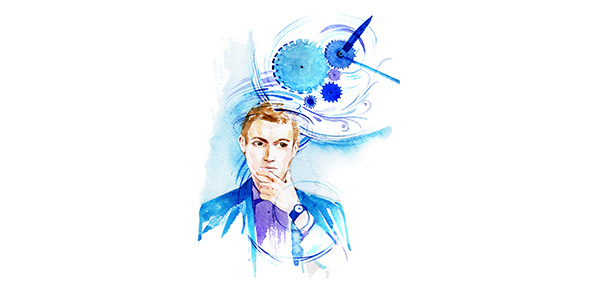|
Front
|
Back
|
Geons and “impossible
figures”
|
- Geons
(like alphabet that makes sounds)- alphabet of shapes that we make things
out of (form shapes from geons)
- Impossible
figure (MC Escher- images that it is impossible to do a geonic analysis
(can’t break them down into geons)
|
Prototype theory of meaning
|
- Prototype-
familiar or typical example
- Categories-
ex- Soda= Coke
- We
decide whether an object belongs to a category by determining how well it
resembles the prototypes of that category by forming concepts
|
|
|
- Process
by which the activation of one concept also activates or primes other
concepts that are linked to it (link a word or concept to related
concepts)
- Ex-
hear Flower, primed to think Rose, Violet, Sunflower, etc; hear Red,
combination of Flower and Red primes you to think Rose
- Priming
a concept gets it started and a small remainder of a concept makes it
easier for someone to think of it
|
Stroop effect and
automatization
|
- Stroop
effect- interference between automized and deliberate ways of thinking
- The
way you’re used to seeing something vs. the way you’re asked to see
something
- Stroop effect: the interference between autmatized and deliberate ways
of thinking. Perception isn’t just taking stuff in, but we figure stuff out
with all of our habits.
- Ex-
Tendency to read a word, instead of saying the color of ink as instructed,
or the rows of numbers from lecture);
- We are
automatized to see certain things, regardless of what we are being asked
to look for (perception)
|
Mental Rotation and
Map Imagescanning
|
- Viewing
a mental image is at least partly like real vision (Mental imagery
experiment)
- Perceiving
an object is the same, even if viewed from 2 different perspectives
- Reasoning
that if people visualize mental images, then the time it takes them to
rotate a mental image should be similar to the time needed to rotate it
- Means
that it is possible for researchers to infer thought processes from
someone’s delay in answering a question
|
|
|
- large changes in visual seen but is undetected by viewer. Doesn’t
coincide with a visual disruption.
- the
frequent failure to detect changes in parts of a scene
- see
sudden changes, yet not recognize anything that occurs slowly or whole
blinking or moving your eyes (esp. if working memory is occupied)
|
|
|
- During
a brief time after perceiving one stimulus, it is difficult to attend to
something else (just seen number 4, hard to recognize next number)
- Just
as you don’t see something when you blink, you don’t attend to something
- Attention
does not shift easily because so absorbed
-
We don’t attend equally to all points in time, also we
cannot focus on all points in time. It takes time to shift attention from one
item to another. During a brief time after we perceive one stimulus, it is
difficult to attend to something else.
|
|
|
- expertise within a
given field that enables them to solve problems quickly with a minimum of
error
- Learn
to apply appropriate algorithms quickly
- Recognize
which heuristics work in a particular situation and which don’t
- The
people develop skills by practicing certain devices (ie- memory champion
practiced mnemonic devices)
- Requires
approx. 10 years of intense practice; even someone born with talent needs
years of work to develop expertise
- Developing
expertise expands the axons, dendrites, and probably cell bodies in the
brain areas relevant to that skill
|
Algorithms and
heuristics
|
- Algorithm- a mechanical, repetitive
procedure for solving a problem or testing every hypothesis
- You
can solve a problem more quickly if you recognize it is similar to one
you had solved before
- Ex-
alphabetizing a list
- Heuristics- strategies for
simplifying a problem or for guiding an investigation
- Mental
shortcut for making decisions
- Simplify
and generate a satisfactory guess
- Quick,
unconscious, and not deliberated
- Used
when you have to make a decision with limited info; ex- which city has
greater population and you chose city that you’ve heard of
-
Hueristics can lead us atray.
hueistics: rule of thumb in thinking. The kinds of short
cuts that we take. These shortcuts are not out of stupidity, they are
worthwhile.
|
Representativeness
heuristic
|
- Use a
few instances to represent an entire category
- Assumption
that an item that resembles members of some category is probably another
member of that category
- Ex-
don’t buy a certain kind of car b/c friend’s blew up or if something
looks, walks, and sounds like a duck we assume it’s a duck
|
Representativeness
heuristic
|
- Use a
few instances to represent an entire category
- Assumption
that an item that resembles members of some category is probably another
member of that category
- Ex-
don’t buy a certain kind of car b/c friend’s blew up or if something
looks, walks, and sounds like a duck we assume it’s a duck
|
|
|
- How
common two categories are
- when
deciding whether something belongs in one category or another (look at how
closely it resembles two categories and then at base rate info aka how
close those two categories are)
|
|
|
-
Availibilty hueristics: uncommon events can be easier to
remember than common ones.
Availibilty assumes that commonness is linked to how easily we can
remember certain examples.
- Basing
a decision on the most easily recalled alternatives
- Strategy
of assuming that how easily one can remember examples of some kind of item
indicates how common it is
- Ex-
media emphasizes bad events so we overestimate how common they are (like
flying vs. driving accidents)
|
|
|
- Overestimation
of the accuracy of one’s opinions or predictions
- Most
people are overconfident of how well they understand complex physical
processes
|
|
|
- Tendency
to accept one hypothesis and then look for evidence to support it, instead
of considering other possibilities
- Functional
fixedness- tendency to adhere to a single approach or a single way of
using an item
|





